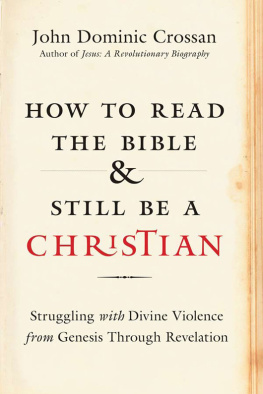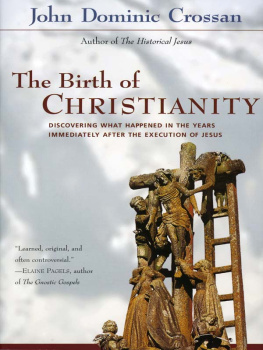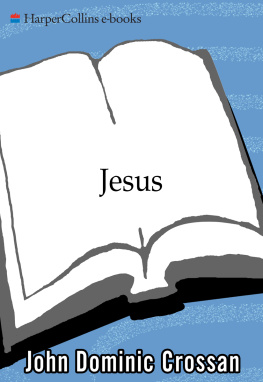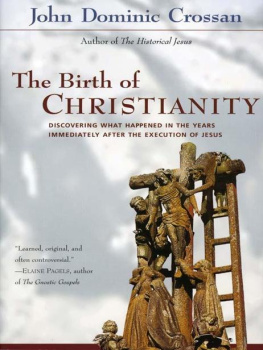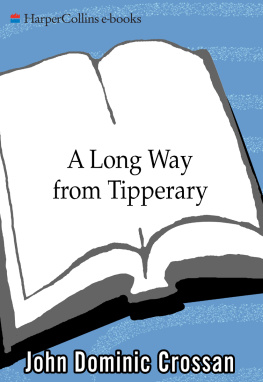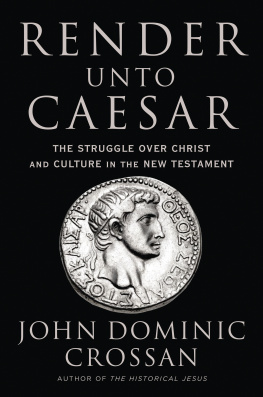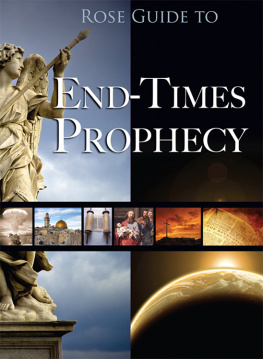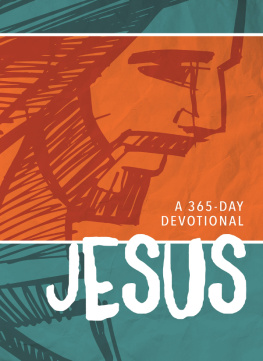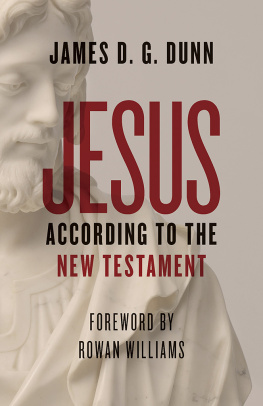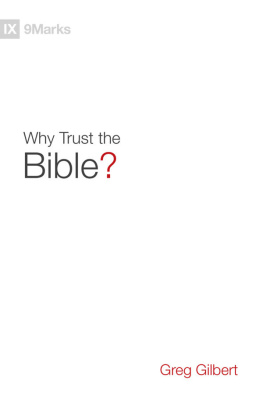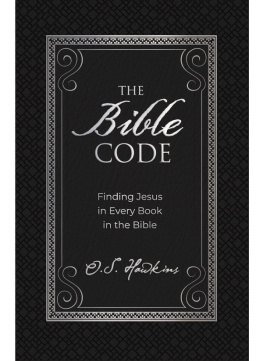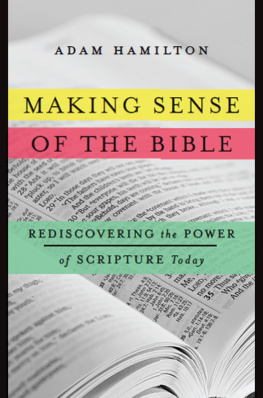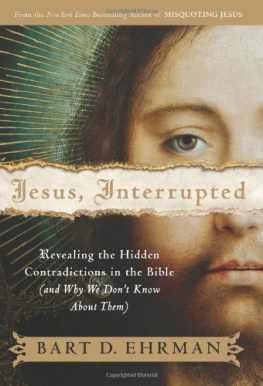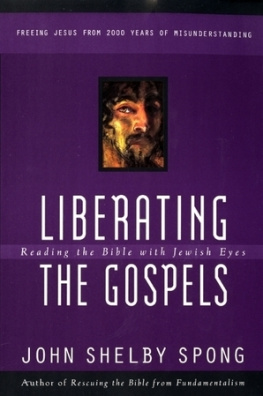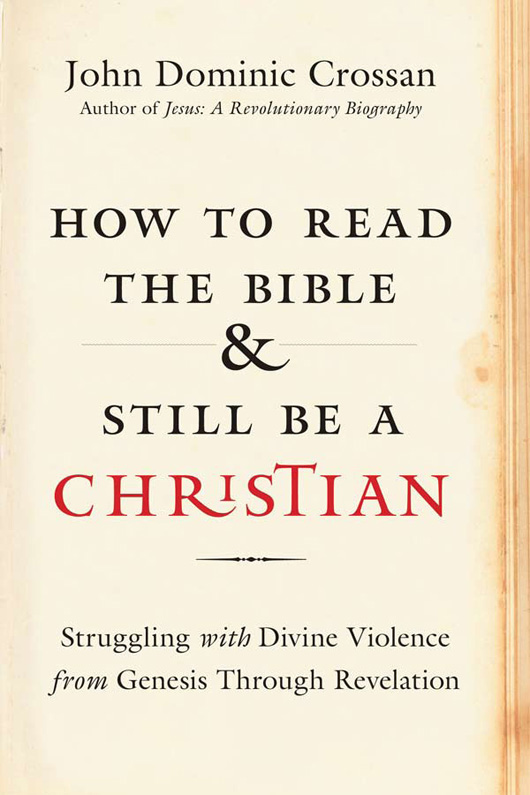CONTENTS
Guide
For
Anne K. Perry
&
Alan W. Perry
We had fed the heart on fantasies,
The hearts grown brutal from the fare.
WILLIAM BUTLER YEATS,
The Stares Nest by My Window (1922)
THIS BOOKS TITLEHow to Read the Bible and Still Be a Christianimagines some serious tension within the Christian Bible, between being a faithful reader and being a faithful Christian. But how, when, and where I first saw this problem influences how, when, and where I first saw the solution. Here, then, to begin with, are some autobiographical details as full disclosure for what is at stake for me in the problem I propose for you and the solution I offer to you in this book.
A disclosure is already implicit in my triple name on this books cover. John Crossan is the name on my drivers license, passport, and TSA pre-check protocols. But in 1950, at the age of sixteen, I entered a thirteenth-century Roman Catholic monastery and became Brother Dominic. My new vocation was supposed to wipe out, as it were, my past identity and give me only a future destinyas in the biblical, so in the monastic tradition.
Nineteen years later, having finally realized that celibacy was vastly overrated, I left both monastery and priesthood to get married. But even if the rules had changed to allow a married priesthood, I still would have resigned in 1969. What was my problem?
My monastic superiors had recognized that five years of Greek and Latin in an Irish boarding school could not be wasted so they decided I should become a professor of biblical studies after ordination in 1957. I was not, and did not expect to be, consulted on any of their plans. Under my vow of obedience I did what I was told, but to be honest, I loved their decision.
In the Roman Catholic tradition it was required, and wisely so, that a degree in theology should precede any degree in biblical studies. First, therefore, I was sent back to Ireland for a doctorate in theology, then for two years to the Pontifical Biblical Institute in Rome, and finally for another two years to the French Biblical and Archaeological School in Jerusalem. It was, quite frankly, a magnificent education.
What should be kept in mind is that I was a Christian before I became a scholar but also a theologian before I became an historian. In other words, I have always understood the Christian Bible through those multiple optics, but I could always speak or write while seeing through the specific lens expected by a particular audience or demanded in a given situation. I should also admit that I never found those divergent viewpoints either confusing or alarming because of one fundamental conviction I have had for a long time: that reason and revelation or history and theology or research and faithby whatever namescannot contradict one another unless we have one or both wrong.
I am not sure where the serenity of this assurance came from, but it has never left me. My courses in theology were heavily invested in the Summa Theologiae of Saint Thomas Aquinasand that was, like the name Dominic, another thirteenth-century gift. My monastic superiors emphasized Aquinas to teach us what to think, but I also absorbed his writings greedily for how to think. If Aquinas spent the morning reading pagan Aristotle and the afternoon writing Christian theology, and never found a conflict between reason and revelation spoiling his lunch or disturbing his siesta, there must be no conflict between reason and revelation or any other such disjunctive pairs. That, at least, was my conclusion forever after.
As it happened, my departure from both monastery and priesthood had nothing to do with history and the Bible but everything to do with theology and the Pope. In the fall of 1968 I said on PBS that the encyclical Humanae Vitae was wrong about birth control. That led to an immediate rebuke from the cardinal archbishop of Chicago. When the dust finally settled about six months later, Cardinal Cody was still the archbishop but Father Dominic was both an ex-monk and an ex-priest.
When I moved from seminary to university in the fall of 1969, my research focus was already established on the historical Jesus, that is, on the living, breathing first-century Jew proclaimed as Messiah/Christ and Son of God by some of his contemporaries but crucified as rebel and alleged King of the Jews by official Roman power. That focus had actually started far back in September 1960 when my religious superiors sent me to be chaplain for a group of Americans on a Roman Catholic pilgrimage across Europe. We visited Castel Gandolfo for John XXIII, Fatima and Lourdes for Mary, Lisieux for Thrse, and Monaco for Grace (honestly!). And since it was 1960, we spent a day at Oberammergaus Passion Play, performed every ten years in the foothills of the Bavarian Alps.
In 1634 and every decade thereafter the villagers have fulfilled their promise of a full-day Passion Play in thanksgiving for deliverance from plague. Something happened for me that day when I first saw as drama a story I knew full well as text. The play made me confront new questions. How had the same crowd that filled the huge stage that morning to welcome Jesus on Palm Sunday become changed by afternoon to cry for his crucifixion on Good Friday? It was for me a quiet but clear epiphany that something was missing from that story of Jesuss passion, something was wrong when acclamation became condemnation without any explanation.
The play I saw in 1960 was the same version that Adolf Hitler saw in 1930 and 1934 (the tercentenary year)that is, both before and after he became chancellor of Germany. His review: Never has the menace of Jewry been so convincingly portrayed as in this presentation of what happened in the times of the Romans. There one sees in Pontius Pilate a Roman racially and intellectually so superior, that he stands out like a firm, clean rock in the middle of the whole muck and mire of Jewry.
My interest in and focus on the historical Jesus started that day in Oberammergau. But its memory meant that for me history would have to be laced with theology and that I could never reconstruct the historical Jesus as dispassionately as I might, say, the historical Alexander. Only good, honest, and accurate history might save Christian faith from a theological anti-Judaism as the continuing seedbed for racial anti-Semitism. That was why, after my return to Chicago in 1961, I joined Rabbi Shaalman on a Sunday morning TV program called (from memory) Deicide or Genocide? It was also why my very first scholarly article was called Anti-Semitism and the New Testament (Theological Studies, 1965).
Starting with my 1973 book In Parables: The Challenge of the Historical Jesus, and for the next twenty years at DePaul University in Chicago, that subtitle was the heart of my scholarly research and professional life. During those years my emphasis was always on history rather than theology, and questions of personal faith were bracketed as irrelevant for academic discourse. I myself, however, was always very aware of them. All of that started to change in 1991.
In that year I published the big Jesus book I had been preparing in bits and pieces across those two decades. I actually wrote The Historical Jesus: The Life of a Mediterranean Jewish Peasant for my academic peers and intended to raise the question of sources and methods for historical Jesus research. That did not happen, but something else did, and as far as I am concerned, it was much more important in the long run.

